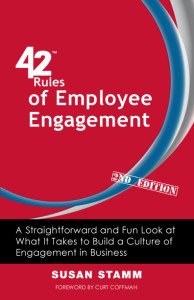Begin a 42 Rules Book Club/ Learning Circle Today!
Use these templates to explore the rules more deeply and their implication for you and your team. Two ways to access the templates below:

Click Cover to Order Online
Get the entire set in one download:
Download Templates One-at-a-Time as you need them:
Rule 1: Rules are Meant to Be Broken–
This template offers a worksheet to begin the analysis of organizational rules and policies impact on customer and employee engagement.
Rule 2: Get Under New Management-
This template provides worksheet to identify both the skills you wish to improve and the team members you will enlist to coach you and provide feedback along the way. It has you develop a strategy for getting under new management successfully.
Rule 3: Begin at the Very Beginning-
This template provides a simple process for implementing a team approach to hiring
Rule 4: Listen, Listen, Listen-
This template offers worksheet for improvement strategy selection and reflection on listening approaches with different members of the team
Rule 5: Be a Hands On Manager-
This worksheet provides process for analysis of silver bullets at play on three different levels within the organization. It has you examine the impact on both the customer and employees.
Rule 6: Be a Low Tech Communicator-
This template offers analysis and tracking of communication mode for three members of your team. It challenges you to get input on your team’s perception of how genuine the communication really is and challenges you to respond to this input.
Rule 7: Everyone Needs Feedback-
This worksheet has you gather input from you team on the areas they’d most like to see you improve. Based on these conversations, you can rank order their input in priority order and develop target dates as you begin to work on each new skill you tackle.
Rule 8: Keep Learning-
This template unlocks the door to 25 weeks of learning activities that address both personal productivity and team development.
Rule 9: Allow Your Team to Grow–
This template walks you through complete strategy and planning process to tap into more of your teams talents
Rule 10: Support Team Members When Needed-
This worksheet allows you to create a tailored plan for each member of your team to meet their unique needs in those rare times they may need a little extra support from the team.
Rule 11: Relationships Determine Results–
This template provides a process for you and your team to explore the three solutions to all human relations problems and analyze past success and results with each.
Rule 12: Sharing Builds Community-
This worksheet helps you reflect on the relationship between your behavior and your team’s behavior regarding the sharing of information. It has you assess your current level of sharing for its impact.
Rule 13: Your Beliefs Drive Results-
Has worksheet has you explore the beliefs you hold about each member of your team. As you formulate this list of beliefs, you examine each for potential impact.
Rule 14: Your Still the Boss-
This template has you analyze the last three decisions you worked through with your team to determine the level of authority you typically maintain in this process. This process helps you to assess your leadership style and determine if it is in balance.
Rule 15: Everyone’s Not Like You-
This template provides links to audio “tours” of two books written about the DISC model and provides a worksheet to process and plan to use what is learned with your team.
Rule 16: Be Direct with People Who Value Results-
This worksheet provides a strategy planner for those team members you identify who operate from the
“D” personality type of behavior. The worksheet includes a list of suggested relationship tips for interacting more effectively with people who operate from this style of behavior.
Rule 17: Be Enthusiastic with People Who Value Enthusiasm-
This worksheet provides a strategy planner for those team members you identify who operate from the
“I” personality type of behavior. The worksheet includes a list of suggested relationship tips for interacting more effectively with people who operate from this style of behavior.
Rule 18: Be Accepting with People Who Value Sincerity-
This worksheet provides a strategy planner for those team members you identify who operate from the
“S” personality type of behavior. The worksheet includes a list of suggested relationship tips for interacting more effectively with people who operate from this style of behavior.
Rule 19: Be Reliable with People Who Value Quality-
This worksheet provides a strategy planner for those team members you identify who operate from the
“C” personality type of behavior. The worksheet includes a list of suggested relationship tips for interacting more effectively with people who operate from this style of behavior.
Rule 20: Build Self Esteem When Discussing Performance-
This template provides a suggested model for having a performance discussion to role play with a peer before taking the discussion to the employee. You can refine your approach with the feedback of a colleague and be truly prepared for a successful outcome.
Rule 21: Involve to Engage-
This template provides a planning process for managers who have a difficult time delegating or offering assignments to team members for fear the project to task will not meet their standards.
Rule 22: Use Your Head-
This template provides a place to gather information during critical conversations with each team member about their “stretch goal” (both personal and professional). It also offers a process for helping the team reframe challenges and difficulties the team has faced so it can stay focused on goals.
Rule 23: You Don’t Have to be the Smartest Person in the Room-
This worksheet provides a way of analyzing your need to have all the answers or to help your team find the answers.
Rule 24: Compete with Competitors-
This template provides a simplistic but powerful process to develop a team approach and reduce internal competition on your team.
Rule 25: Get Out of the Shower-
This template offers a process for analyzing the real impact of a fear’s paralyzing effects and and then comparing this cost to impact of facing a fear and failing.
Rule 26: Turf is for Stadiums not for Teams-
Rule 27: Right Actions Bring Engagement-
This template offers a powerful way to audit your teams time investment in the various tasks, projects and activities it is tied to. The team will have a big picture to do some analysis and decide on adjustments.
Rule 28: Leave Your Good Parenting Skills at Home-
This worksheet helps you assess if you are a good parent manager.
Rule 29: Leave Your Bad Parenting Skills at Home-
This worksheet provides a process for having team members assess you on a list of bad parenting attributes and gather input on requested improvements the team desires.
Rule 30: Expect Exceeded Expectations-
This worksheet provides a process for charting your team member’s current “capacity” as you see them… and then envision them at a capacity ten times this current view of them.
Rule 31: It Only Takes a Minute-
This template provides a simple tracking tool for brief encounters with your team to ensure you utilize coaching moments for both recognition and for corrective coaching.
Rule 32: Recognize Good Performance-
This template provides a way for you to analyze the ratio of positive to negative feedback you provide to each member of your team and assess the impact of your approach.
Rule 33: Problem Solving is a Team Sport-
This template leads you through the six step process outlined in the book and has you reflect afterward on the results as compared to “off the cuff” problem solving approaches.
Rule 34: Help Your Team Accept Change-
This worksheet walks you through questions associated with each step of the change model in the book.
Rule 35: He Who Has the Gold Rules-
This worksheet provides a place to collect the desires of each team member concerning how they want to be treated on the team and if they feel these needs are generally met by the team.
Rule 36: Build Acceptance, Reject Prejudice-
This template provides a simple but powerful activity to point out the similarities the team has with each other. It enables team members to get to know each other on a more personal basis.
Rule 37: Honesty is Always the Best Policy-
This worksheet walks the team through an audit of the organizations, the teams, and the individual promises that are made to the customer and each other to be sure they are appropriate and realistic.
Rule 38: Give it Your All-
This template offers an audit of the team’s talents and an assessment of the benefit the team (and customer) reap from these skills and gifts.
Rule 39: Know What you Want–
This worksheet provides a simple clear way to get alignment on your team.
Rule 41: Ask, Don’t Tell-
This worksheet is an awareness tool to begin to see the amazing number of coachable moments at your disposal. It is also an assessment of your coaching style.
Rule 42: These are My Rules What are Yours?-
This final template simply suggest you ask your team what they need to be more fully engaged in the work of the organization. You’d be amazed the results such a question can produce.









